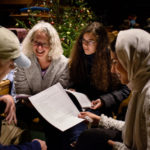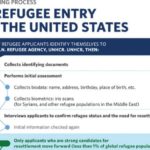Supreme Court Allows Limited Version of Trump Travel Ban to Take Effect
Update from Stephen W. Yale-Loehr of Miller Mayer, LLP | June 26, 2017
Today the U.S. Supreme Court decided to hear the government’s appeal of two lower court decisions that had blocked President Trump’s executive order banning travel from six Muslim-majority countries for 90 days and suspending the U.S. refugee program for 120 days. The Supreme Court order today kept in place part of the lower court injunctions, but stayed the lower courts’ decisions for foreign nationals “who lack any bona fide relationship” with U.S. persons. The Supreme Court will hear arguments on the merits of the executive order in October.
The Supreme Court’s order is a partial win for the Trump administration, but will be confusing to implement over the summer. According to the order, the administration cannot block entry of individuals from the six affected countries (Libya, Iran, Somalia, Sudan, Syria, and Yemen) and refugees from around the world if they have “a credible claim of a bona fide relationship with a person or entity in the United States.” How individuals will prove such a relationship, and whether the burden of proof will be on the government or the individuals seeking entry, remains to be seen.
The Court’s order provided the following examples of bona fide relationships:
“The facts of these cases illustrate the sort of relationship that qualifies. For individuals, a close familial relationship is required. A foreign national who wishes to enter the United States to live with or visit a family member . . . clearly has such a relationship. As for entities, the relationship must be formal, documented, and formed in the ordinary course, rather than for the purpose of evading [the executive order]. The students from the designated countries who have been admitted to the University of Hawaii have such a relationship with an American entity. So too would a worker who accepted an offer of employment from an American company or a lecturer invited to address an American audience. Not so someone who enters into a relationship simply to avoid [the executive order]. For example, a nonprofit group devoted to immigration issues may not contact foreign nationals from the designated countries, add them to client lists, and then secure their entry by claiming injury from their exclusion.”
Based on those examples, an international student from one of the six affected countries who is already in the United States should be able to leave for the summer and return. Similarly, a refugee who has an established relationship with a U.S. refugee resettlement agency should be allowed to enter the United States. But much may be left up to the discretion of State Department consular officers at U.S. embassies and consulate, and Customs and Border Protection officers at ports of entry. If an individual is denied a visa or entry, the U.S. relative or entity may need to sue on their behalf.
The case will now go back to the two district courts that originally entered the injunctions. They will have to decide these issues.
The Supreme Court’s order is located here.
Stephen W. Yale-Loehr
Miller Mayer, LLP
215 East State Street, Suite 200
P.O. Box 6435
Ithaca, New York 14851-6435
Yale-Loehr is a Professor of Immigration Law Practice, Cornell Law School and Co-Author of Immigration Law & Procedure Treatise








